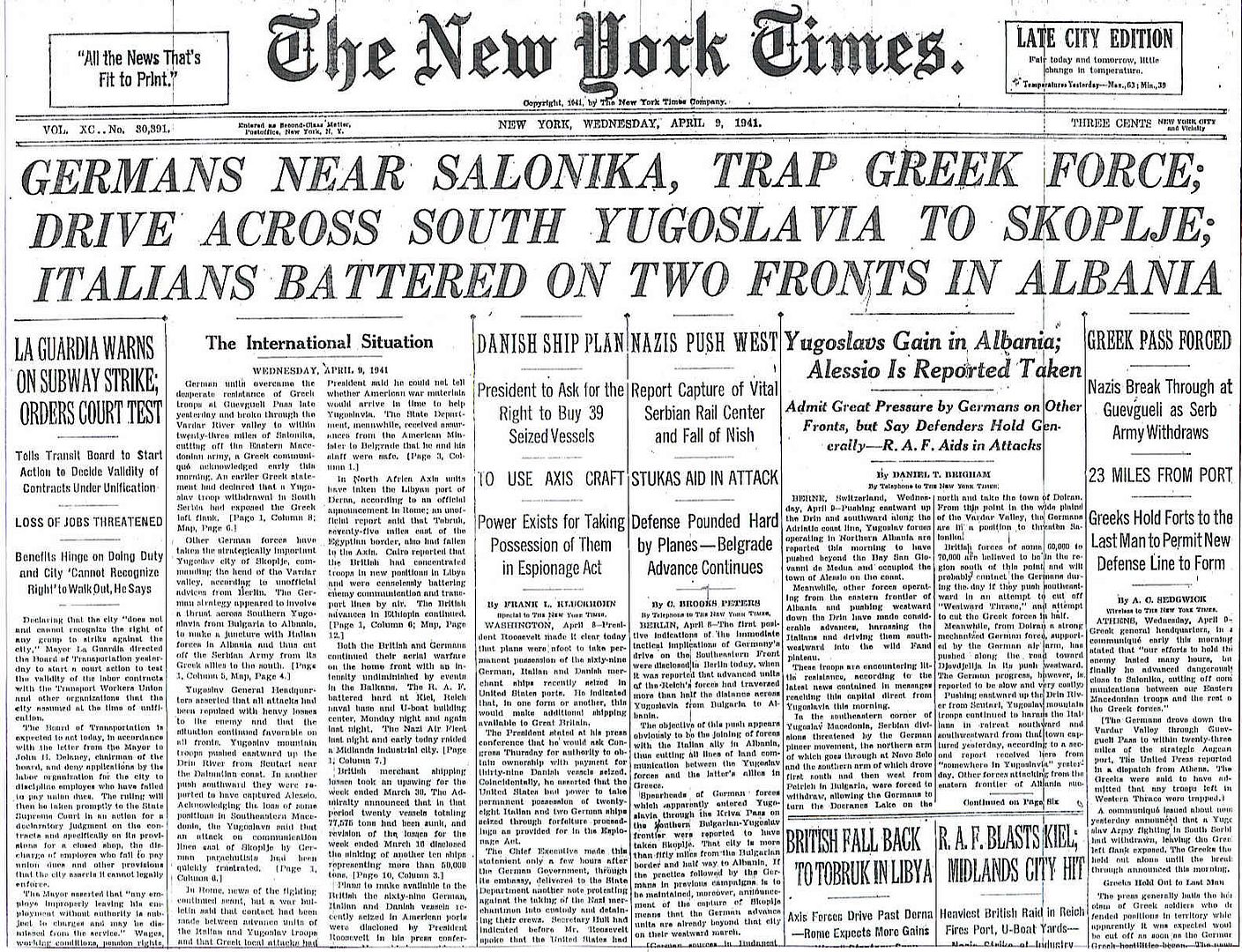
Posted on 04/09/2011 5:29:06 AM PDT by Homer_J_Simpson

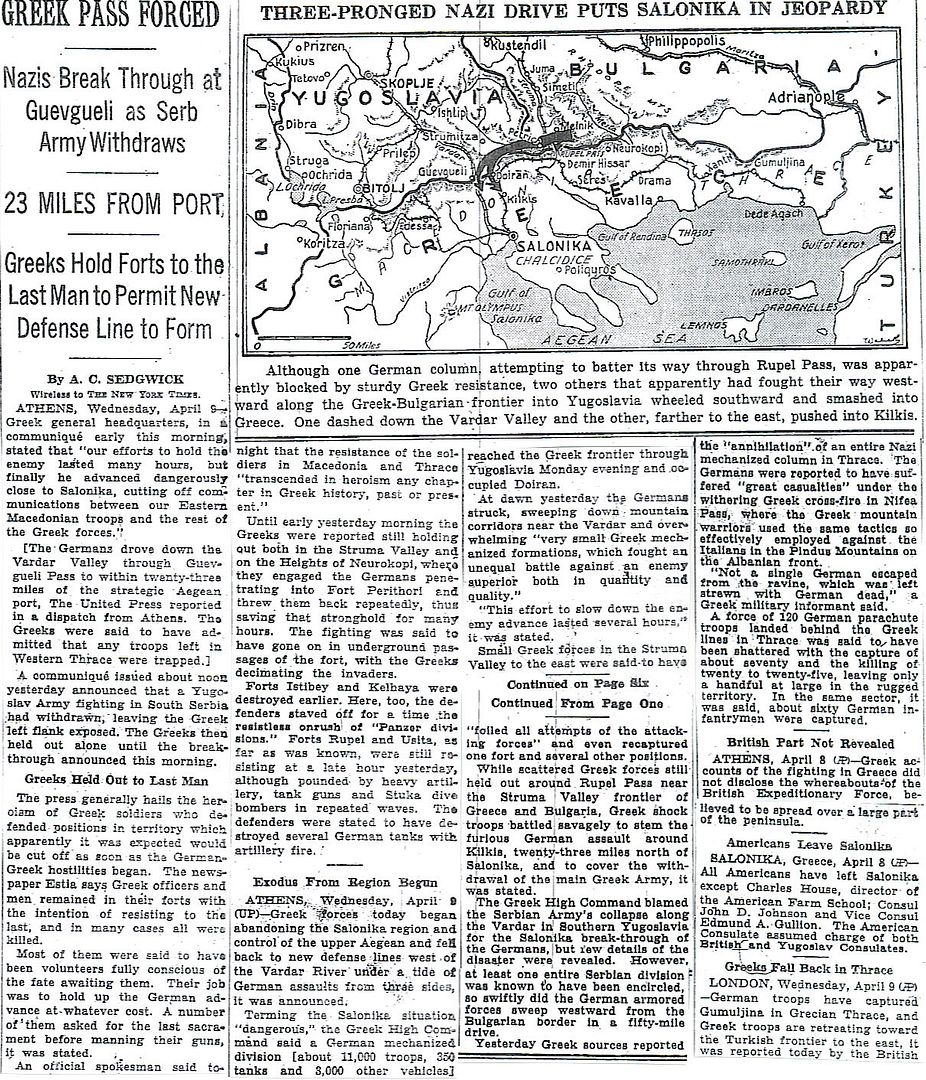
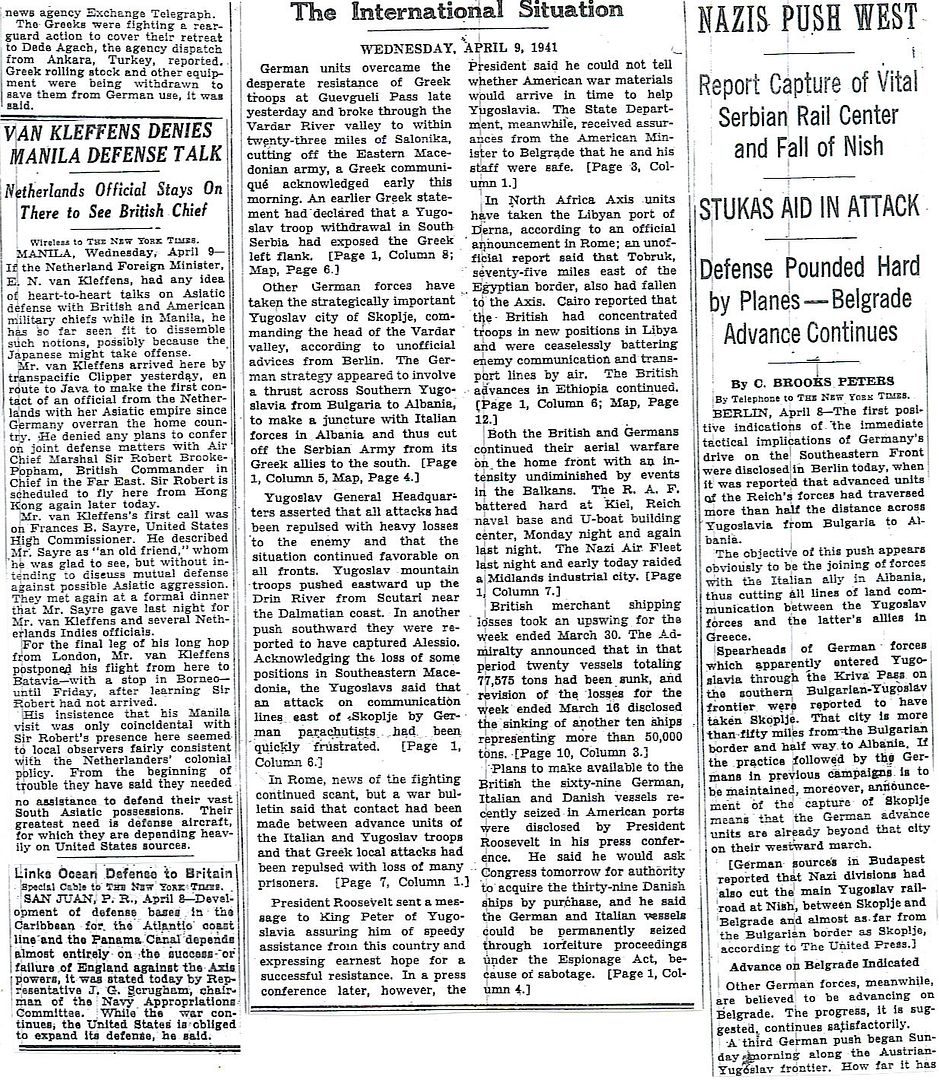
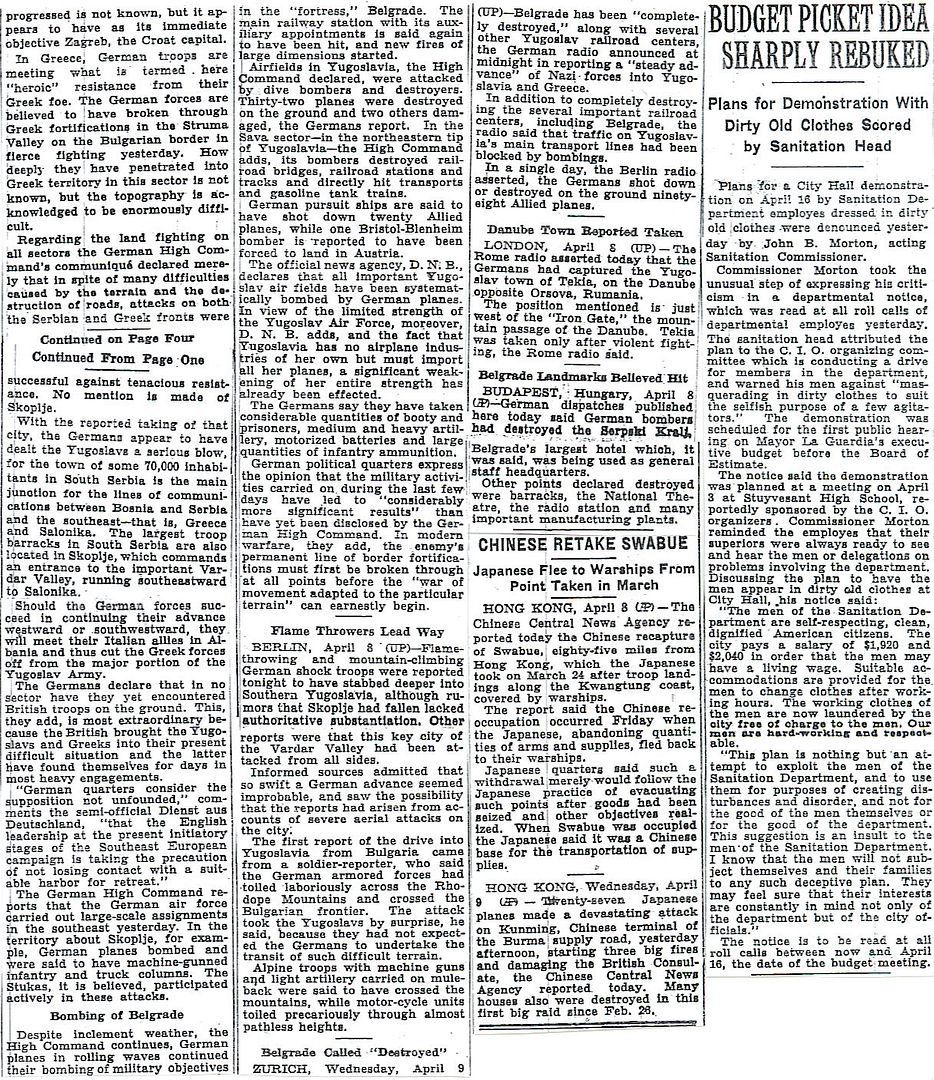
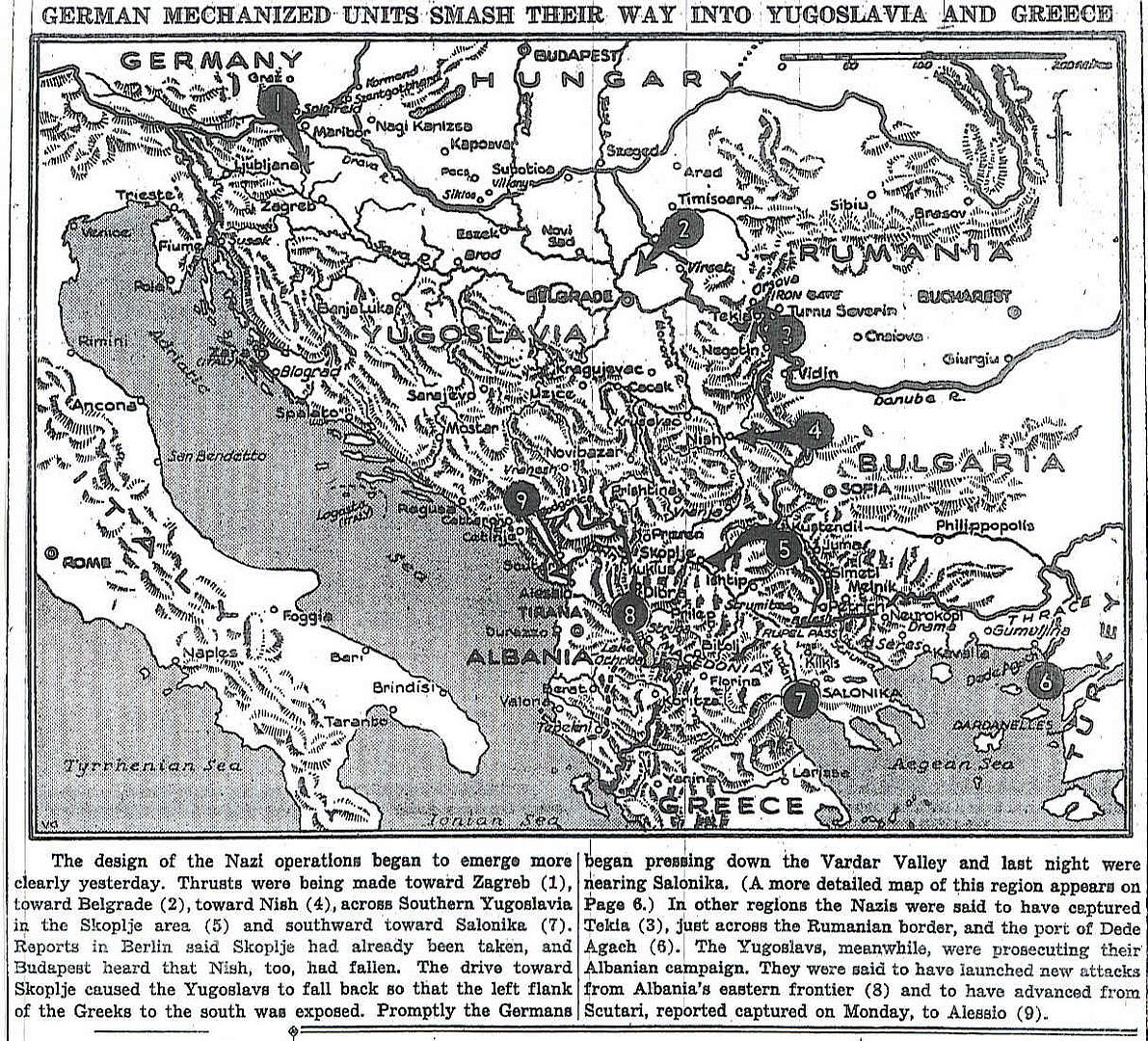
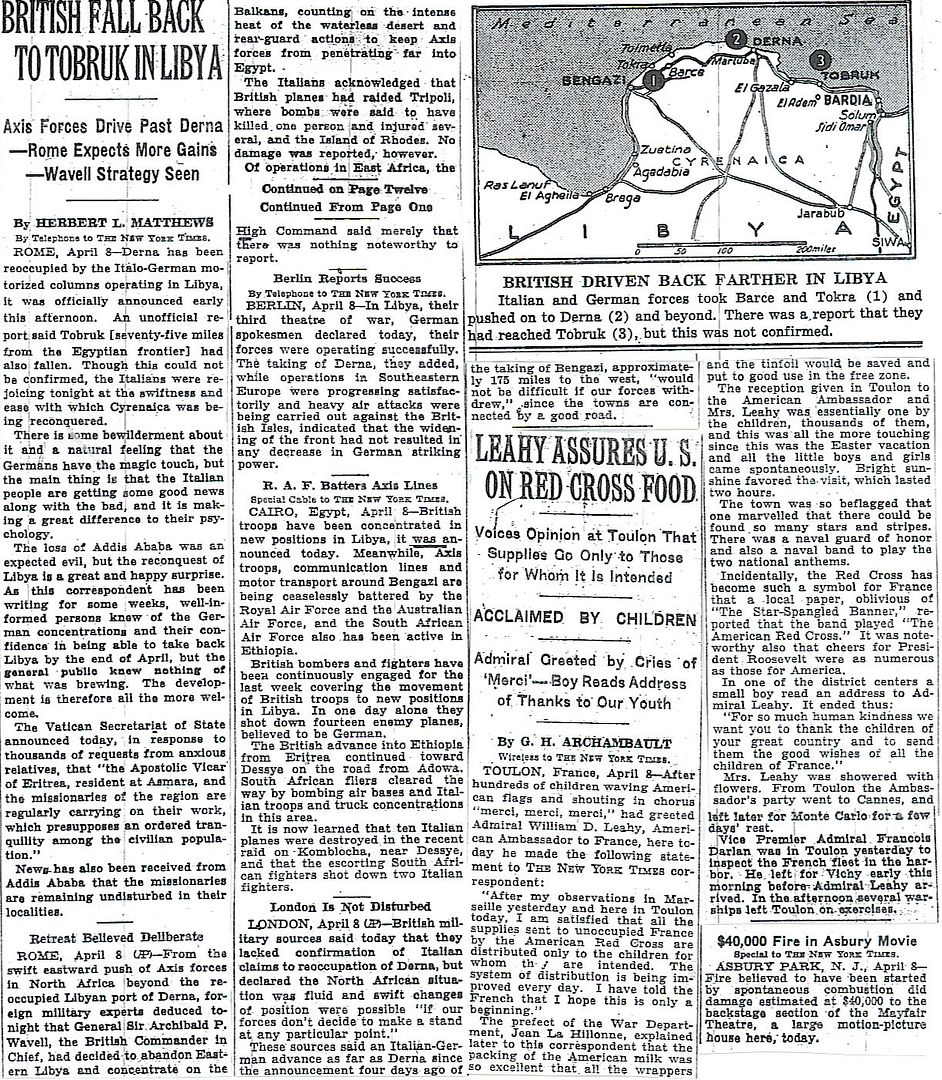
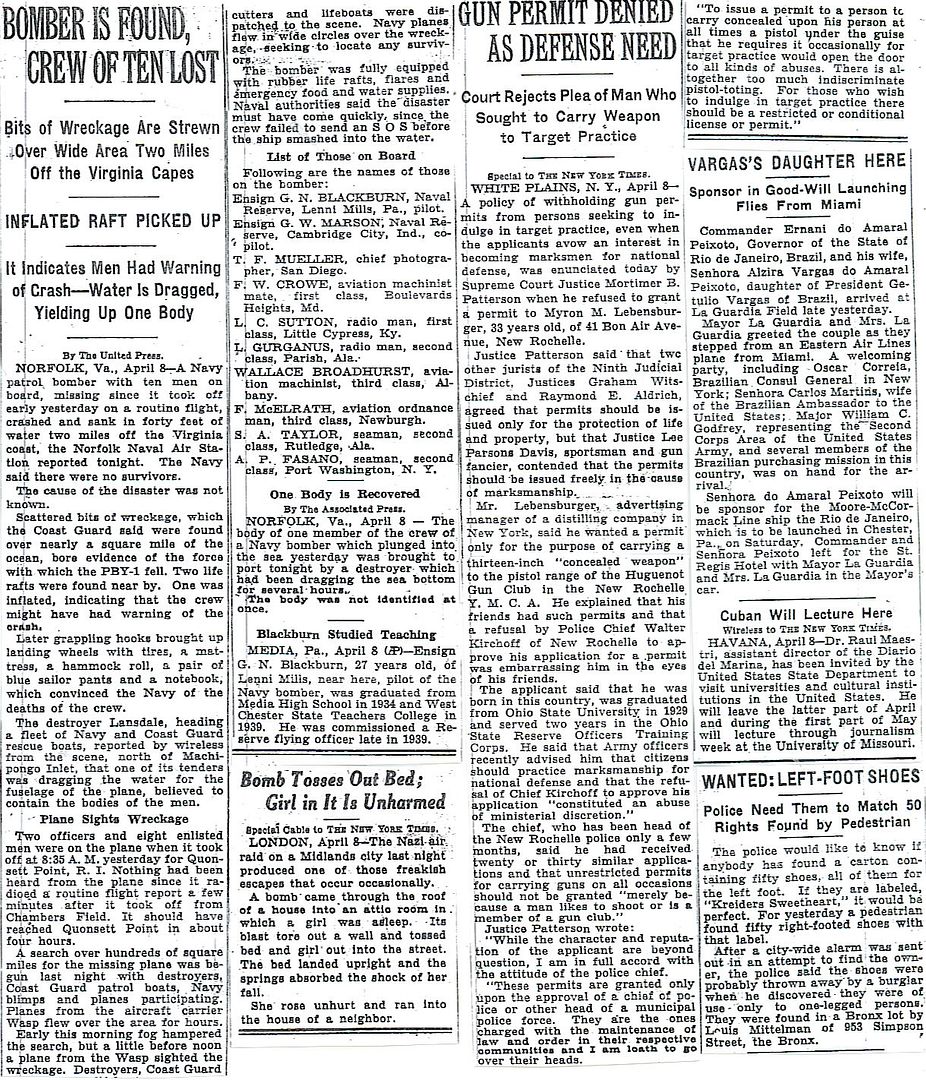
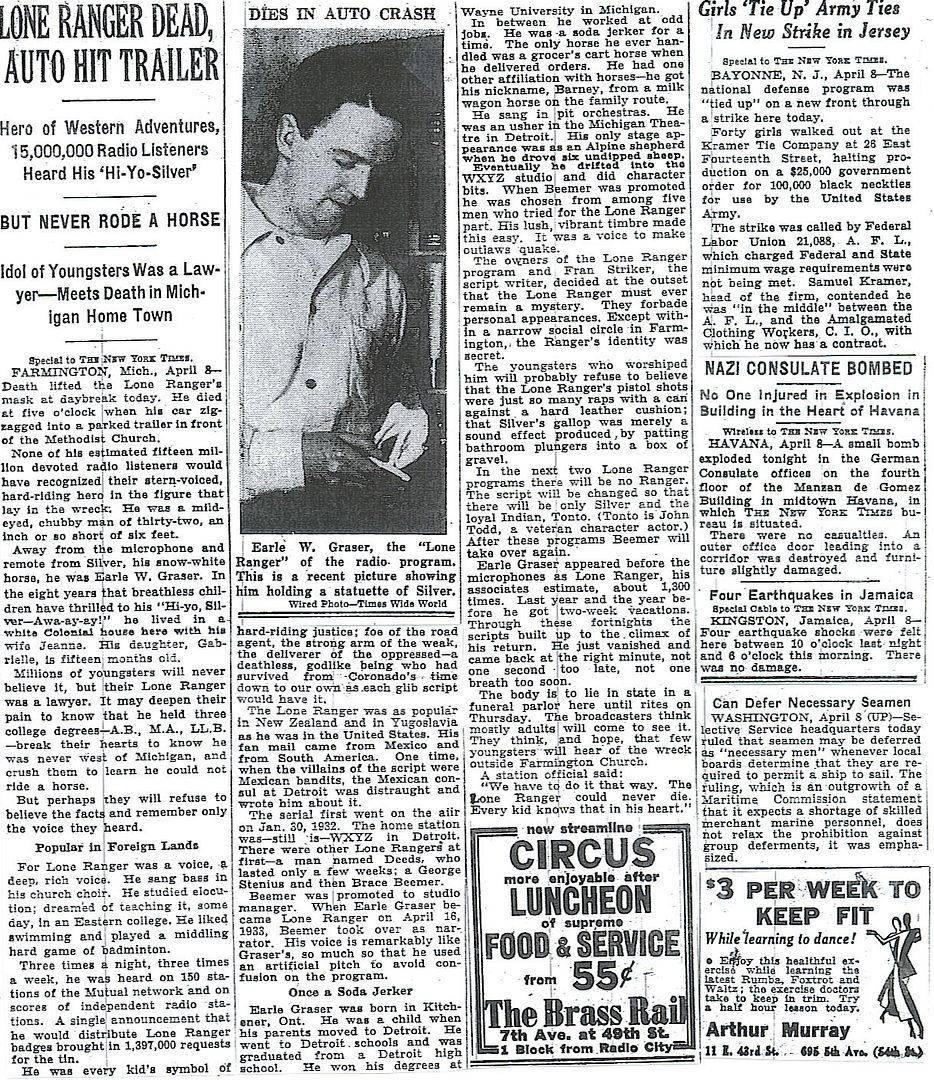
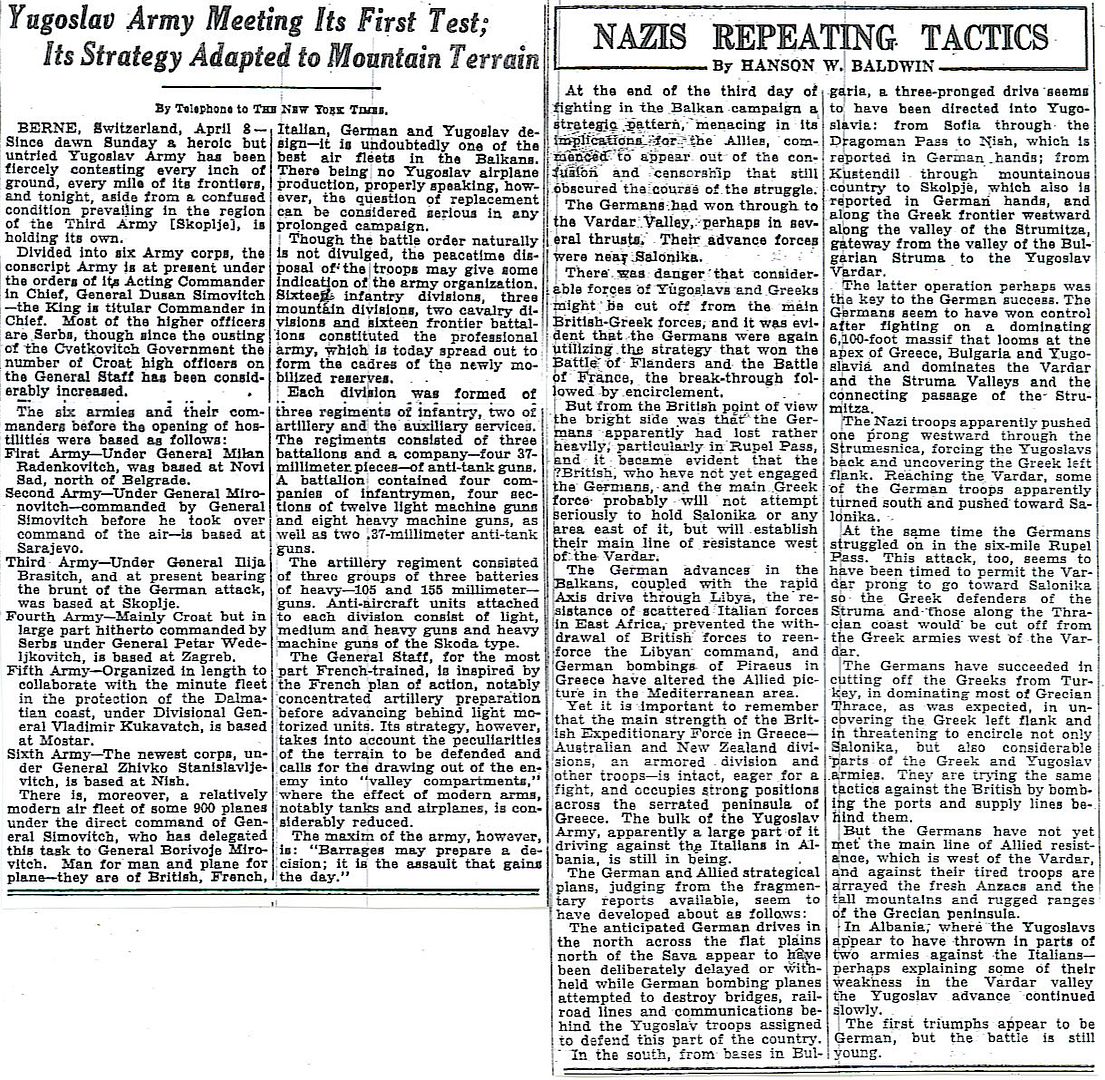
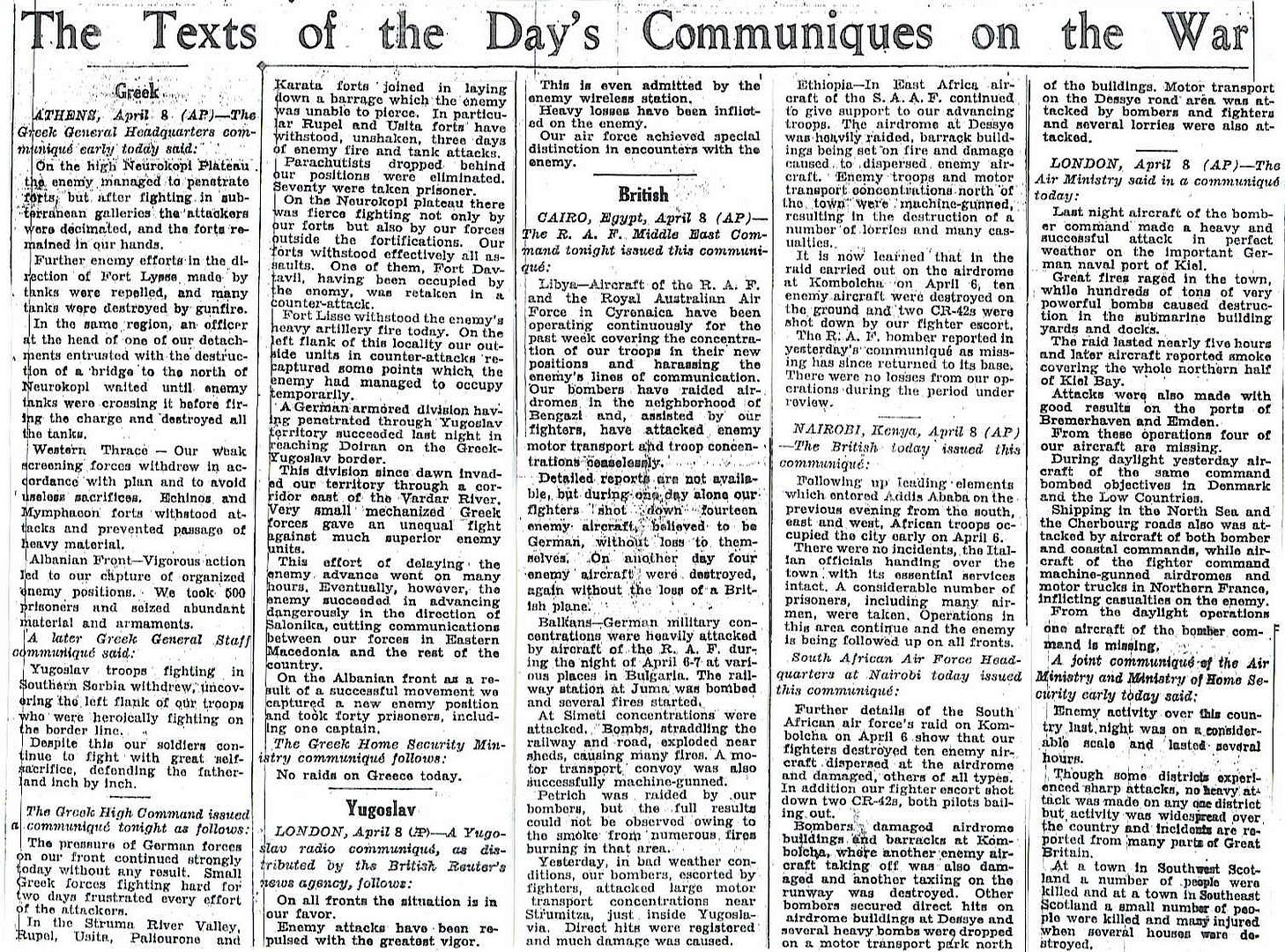
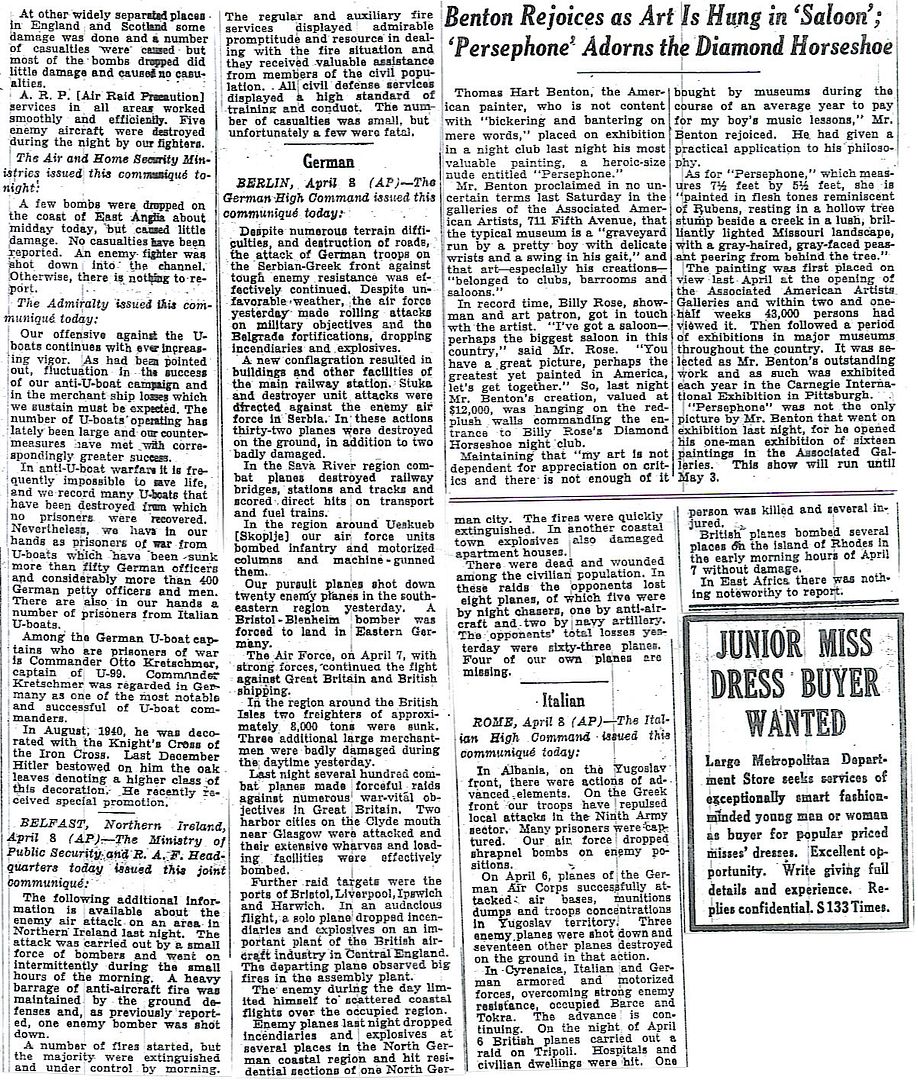
http://www.onwar.com/chrono/1941/apr41/f09apr41.htm
Germans break Metaxas Line
Wednesday, April 9, 1941 www.onwar.com
In the Balkans... The resistance of the Greek forces in the Metaxas Line collapses. Thessaloniki is taken by the 2nd Panzer Division. The Greek 2nd Army, the force defending the Metaxas Line, surrenders. Other German units have taken Monastir in Yugoslavia and are moving south through the Monastir Gap. It will not be possible to hold a strong attack here, although General Wilson (commanding British and Anzac forces in Greece) has strengthened the defending force and it will, therefore, be necessary to withdraw from some of the Aliakmon positions. This possibility is discussed with Greek Commander in Chief, General Papagos, and he concurs. Meanwhile, farther north, the German 2nd Army (commanded by Weichs) joins the attack on Yugoslavia. Two corps move south over the Austrian border, quickly taking Maribor. The third corps, 46th Panzer Corps, is based in Hungary and begins to seize crossings over the Drava River. The two corps from Kleist’s force which began the attack on Yugoslavia have now moved through the southern part of the country and into Greece.
http://homepage.ntlworld.com/andrew.etherington/month/thismonth/09.htm
April 9th, 1941
UNITED KINGDOM: Birmingham is attacked by the Luftwaffe with 237 bombers. Belfast was also bombed last night, killing 13 and injuring 81.
GERMANY: Ernst Heinkel AG are put in control of Hirth Motoren Gmbh in order to speed up production of their turbojet engines.
YUGOSLAVIA: German forces take Veles and are advancing rapidly towards the Albanian border and junction with Italian forces after taking Tetovo and Prilep. Nish has also been captured and the advance guard of the German forces have crossed the Drava River.
The Wehrmacht High Command announced:
Mobile troops and infantry divisions under the command of Field Marshal List, advancing from Bulgaria, have broken through the Yugoslavian border defences and despite difficult mountain terrain, have penetrated over 60 miles into the Skopje (Ueskub) Basin and crossed the Vardar river, thereby cutting off the Yugoslav forces from their Greek and British allies.
Belgrade: The Yugoslav General Staff announced:
All troop reports which have reached our general staff so far indicate that the situation on the fronts is progressing favourably. We have succeeded in halting all attacks and have in part repulsed them. Our troops are fighting with the greatest determination and have inflicted heavy losses on the enemy.
GREECE: The Metaxas Line in Greece collapses.
Salonika: Within three days of crossing into Greece from Bulgaria, German forces have captured the key port of Salonika, and forced the surrender of the whole eastern wing of the Greek army between Salonika and the Turkish border. This brings them within striking distance of the main defence line, which is manned by British, Australian and New Zealand troops.
An announcement from a British military spokesman in Athens indicates though that there has not yet been any contact between Germans and Commonwealth forces, although a small patrol was fired upon by New Zealanders when trying to cross the river Aliakmon.
The danger to the Olympus-Aliakmon line is also an outflanking move from Yugoslavia through the Monastir Gap. Wilson decides to create a blocking force in the Florina valley directly under his command. The 1st Armoured Brigade and the 19th Australian Brigade are detached from Blamey’s 1st Australian Corps and placed under command of General Mackay. Mackay’s force deployed at Vevi where the Monastir valley narrows to 100 to 500 yards and followed a winding course through a defile flanked by steep rock-strewn hills with few trees. (Anthony Staunton)
The strongest resistance to the Germans has been in the Struma valley, where the frontiers of Yugoslavia, Greece and Bulgaria meet. German military spokesmen admitted that the Greeks were putting up a tough fight. But then the weight a German armour forced the Yugoslavs to withdraw, leaving the Greek flank exposed. the Greeks were brushed aside and the Panzers raced on to Salonika.
In a message to his people, King George of the Hellenes says: “We shall win with the help of God and the benediction of the Holy Virgin. Yes, we shall win! The historians will once again have to write that the country renowned for Marathon and Salamis does not waver, does not submit, does not surrender. Forward, Children of Hellas, for the supreme struggle, for your altars and your hearths.”
NETHERLANDS: The government breaks diplomatic relations with Hungary. (Jack McKillop)
LIBYA: The Afrika Korps captures Bardia, a town on the coastal road near the Egyptian border. (Jack McKillop)
U.S.A.: Washington: United States-Danish agreement relating to defence of Greenland by the United States is signed. Department of State BULLETIN, April 12, 1941, Vol. IV, pp. 443, 445.
...Another important contribution to the allied war effort was made by the Danish envoy, Henrik Kauffmann in Washington. He did not recognise the government in Copenhagen during the war and acting on his own he granted the US basing rights in the Danish controlled Greenland. This allowed the transfer of short range aircraft to Britain via Greenland and Iceland... (Erik Juel Anderson)
When Denmark was occupied (9 April 1940) Kauffmann declared himself a free representative, following orders from the government in Copenhagen under the reservations that the government could be acting under German pressure. His main objective in the first years of the occupation was to be recognized by the US government as representative for a free (but non-existing!!) Danish government. In 1941 he got the recognition by signing the Greenland treaty. The Danish government (we didn’t have a government in exile) withdrew his credentials, charged him with high treason and had his property in Denmark impounded. (Klaus Velschow)(57)
The North Carolina Class battleship USS North Carolina (BB-55) is commissioned at the New York Naval Shipyard in Brooklyn, New York. She is first new U.S. Navy battleship to enter the fleet since USS West Virginia (BB-48) was commissioned in 1923. (Jack McKillop)
http://worldwar2daybyday.blogspot.com/
Day 587 April 9, 1941
At 00.37 AM 400 miles Northeast of Canary Islands, U-107 sinks British SS Harparthian carrying RAF stores to Freetown, Sierra Leone (4 killed, 39 survivors make land at Hierro Island, Canary Islands). At 2.16 AM 200 miles Southeast of Iceland, U-98 sinks Dutch SS Prins Willem II (3 dead, 22 survivors in 2 lifeboats are picked up by Swedish steamer Klipparen and British MV Tuscan Star).
Greece. 2nd Panzer Division quickly moves South from Dojran Lake across the coastal plain to the major Greek port of Salonika on Agean Sea. In 4 days, they have outflanked Mataxas Line, isolating Greek forces in Macedonia and Thrace. In addition, German troops arrive at the Monastir Gap in Southern Yugoslavia ready to cross the unfortified border into Greece. This will allow them to cut off the main bulk of Greek Army facing the Italians in Albania and also to get behind the British & ANZAC forces in the Aliakmon Line defending against attack from Bulgaria.
Libya. Rommel orders Italian 27th “Brescia” Division and German 5th Light Division to surround Tobruk, realizing the urgency of attacking before the Allied defenses are organised. However, Australian 9th Division mans the outer defensive perimeter at Tobruk (originally created by the Italians) while a new inner defensive ring is built. Australian 7th Division is diverted from going to Greece, as planned; instead 18th Infantry Brigade is sent to assist at Tobruk while the remaining brigades are to defend Egypt.
In a sign of growing American involvement, the Danish colony of Greenland is made a US protectorate. Danish ambassador to the US, Henrik Kauffmann, signs the agreement on the anniversary of the German occupation of Denmark. Kauffmann will become known as “the King of Greenland”.
Overnight, 237 Luftwaffe aircraft drop 285 tons high explosive bombs and 1,110 incendiary canisters on Birmingham in the English Midlands.
Despite all the unfolding events across the globe, I found the story on the Lone Ranger out of place - yet interesting.....
Tough outting for me on my 20 questions....
Back to the story on the death of the Lone Ranger......he was once a “soda jerker?” I have to look that up...
Quote of the day:
‘the typical museum is “a graveyard run by a pretty boy with delicate wrists and a swing in his gait” ‘ Thomas Hart Benton.
If he’d stuck with Silver this tragic accident would have been averted.
On April 9 a British patrol in the forward area pushed across the Yugoslav frontier in the Monastir sector, and found groups of Yugoslav soldiers drifting across the border into Greece. The patrol returned to report that all Yugoslav resistance in the south had collapsed.
Snow had begun to fall in the mountains, turning to rain in the valleys, and this rendered air reconnaissance difficult –so reliable information was impossible to gather. Events, however, moved fast.
The outflanking of the Metaxas Line by the German XVIII Corps on April 8 led to the capitulation of the Greek Eastern Macedonian Army, and at 8 am on April 9 the main column of German tanks entered Thessaloniki. A protocol of capitulation was negotiated between the German commander of the II Panzer Division and General Bakopoulos, commander of the Greek Eastern Macedonian Army.
The threat which the German XL Motorized Corps offered to the Aliakrnon position was countered by a redeployment of forces in W Group. General Mackay of the 6th Australian Division took over the blocking unit already based on Amindaion, and strengthened it with troops from his 6th Division and contingents from the 1st Armored Brigade withdrawing from the Axios plain. This force was to hold the German advance through the Vevi Gap.
The redeployment was the result of a staff conference between Wilson , Blamey, and Mackay and Greek staff officers, aided by interpreters. Papagos was consulted and agreed to a new line of defense. It was to run, initially, from the Aliakrnon-Olympus position on the right flank, across to the south of Servia, and then up to Klissoura, but the permanent line would be farther south - from Servia along the line of the River Venetikos and across the Pindus range to the Adriatic.
This meant that the Greeks would have to give up not only all the gains they had made in Albania but all of Macedonia as well, for the Greek army on the Albanian front would be withdrawn to the Pindus range at the source of the Venetikos river.
Marshall Cavendish History Of The Second World War-Balkan Blitzkrieg -Edwin Packer
"On a fine Sunday morning, as we were setting out to walk up Pendeli, the air-raid siren sounded. The all-clear followed almost at once and we went on our way, unsuspecting until we joined our friends and learned that Germany was at war with Yugoslavia and Greece.
Having nothing else to do and being powerless to affect the situation, we went on our walk through the beautiful spring sunlight and when we reached the refreshment hut, sat and gazed over the hazy brilliance of Athens and saw the Spitfires that had been sent from Egypt to encourage us. The Spitfires rolled and sported like dolphins over the city, but that night they all flew back to base. Everyone had feared there would be a raid on Athens but there was no raid, and when we returned in the rose-violet twilight, the streets were crowded with people who were excited as though there had been another victory. The Greeks had taken heart again and were telling each other that the new invader would be beaten like the first.
Some English sailors had come ashore and one of them, with a flower behind his ear, was carried shoulder high down the length of University Street. After dark there was a raid on the Piraeus but Athens was untouched. We had moved to a little villa built on rough ground halfway between Athens and the Piraeus. When we went home that night, the sky was aglow but we were too tired to climb the hill behind our house and see what was to be seen.
We went to bed and in the small hours an explosion flung us out of bed. One explosion followed another with tremendous roaring reverberations. The villa shook. As the tremendous clamor rose to a climax, we heard through it the clear, fine tinkle of breaking glass . My chief feeling was indignation. Next morning the road in to Athens, littered with debris and broken glass, was crowded with the homeless who trudged along with bundles and perambulators, dazed with shock and unable to tell us what had happened. They themselves scarcely knew. Someone said a ship had exploded in the harbor. Why? How? How could the explosion of a ship cause such a holocaust? People said the Piraeus had been wiped out. The harbor was in ruins. There were thousands of dead. Not a soul moved in the dock area.
In Athens people gave different versions of the event, The exploded ship had been carrying a cargo of TNT. It was lying in the harbor when the raid started and a direct hit had set it on fire. A British destroyer tried to tow it out to sea but the tow rope broke. When the munitions ship exploded, the destroyer and all aboard her had been annihilated. There was a suggestion of sabotage. The ship should have been unloaded on Sunday but, for no known reason, it was not unloaded. The tow rope broke not once but three times. Athens was said to be full of fifth columnists who were telephoning all the offices and saying that more and worse explosions were expected. Work was at a standstill.
An atmosphere of panic filled the streets."
Marshall Cavendish History Of The Second World War-Flight From Athens - Olivia Manning
Guess that rules out me running a museum.
Disclaimer: Opinions posted on Free Republic are those of the individual posters and do not necessarily represent the opinion of Free Republic or its management. All materials posted herein are protected by copyright law and the exemption for fair use of copyrighted works.